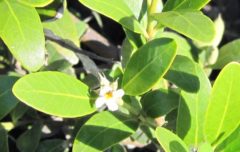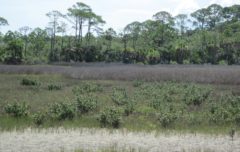The black mangrove, Avicennia germinans, is the most abundant of the three mangrove species found along the Gulf coast, and its range is expanding. Marine Science Center researchers Randall Hughes and Steven Scyphers have just been awarded a grant to explore the impacts of this expansion on the region’s ecosystem and communities.


Avicennia germinans has several clever adaptations to ensure success in the unforgiving coastal environment; it is the most cold-tolerant of the region’s mangroves, it can take up saltwater and expel the salt through its leaves, and can grow pneumatophores, roots that rise up out of the soggy mud and seawater like snorkels to provide air to the tree. This resiliency also means mangroves are displacing salt marshes along coastlines in the Gulf of Mexico, which can have significant impacts on communities dependent on marshes for coastal protection and habitat health.
Drs. Hughes and Scyphers have begun research to examine range expansion of the black mangrove in the northern Gulf of Mexico from Cedar Key, Florida to Port Aransas, Texas, supported by a 697K grant from the Gulf Research Program (GRP) of the National Academies of Sciences, Engineering, and Medicine. This was one of 6 projects awarded by the GRP this year, $5.3 million in total, to enhance understanding of gulf ecosystems.
The Marine Science Center researchers are teaming up with Dr. Christine Shepard, Director of Science at The Nature Conservancy, Gulf of Mexico and Dr. Michael Osland, Research Ecologist at the USGS Wetland and Aquatic Research Center, to use coupled natural-human systems approaches to study the black mangrove.
The project will examine the current and future geographic distribution and associated ecosystem functions of black mangroves, and how these are impacted by the social and policy landscape in the northern Gulf of Mexico.
Existing data on the black mangrove’s distribution and ecosystem function, as well as analysis of the current attitudes, beliefs and decisions of stakeholders in the region, will inform projections of the future of this critical species and its place in the local environment.
The researchers ultimately hope to connect this valuable ecological and social data with enhanced Coastal Resilience decision support tools, including a Mangrove Explorer interactive app to help determine the communities most at risk due to these ecosystem changes.
Learn more about the Gulf Research Program Awards.



